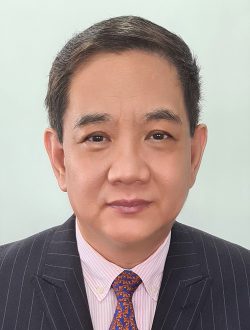Biography
Chao-Fu Wang received the B.Sc. degree in mathematics from Henan Normal University, China, in 1985, the M.Sc. degree in applied mathematics from Hunan University, China, in 1989, and the Ph.D. degree in electrical engineering from the University of Electronic Science and Technology of China, China, in 1995.
From 1987 to 1996, he was a Lecturer and then an Associate Professor with the Nanjing University of Science and Technology, Nanjing, China. From 1996 to 1999, he was a Postdoctoral Research Fellow with the Center for Computational Electromagnetics, University of Illinois at Urbana-Champaign. He came to Singapore in 1999 to join the Department of Electrical and Computer Engineering, National University of Singapore (NUS), Singapore, as a Research Fellow. In 2001, he was transferred to the Temasek Laboratories (TL) at NUS, Singapore, as a Research Scientist, where he became a Senior Research Scientist in 2007 and a Principal Research Scientist in 2011. He has been leading TL Propagation and Scattering Group at NUS for many years to successfully conduct and accomplish research programs funded by Singapore Government. He co-authored Characteristic Modes: Theory and Applications in Antenna Engineering (Hoboken, NJ: Wiley, 2015). He has published more than 250 journal and conference papers, and filed six international WIPO/PCT patents. His research interests include fast and efficient algorithms for computational electromagnetics, theory of characteristic modes and its applications, fast design and analysis of antennas and antenna arrays, fast prediction of electromagnetic (EM) scattering from electrically large and complex objects, efficient modeling of electromagnetic compatibility (EMC)/electromagnetic interference (EMI) for practical platform, and real time simulation of EM imaging and processing.
Dr. Wang served as a Chairman of the IEEE Singapore MTT/AP Chapter in 2013. He was a co-recipient of the 2009 Best Applied Computational Electromagnetics Society (ACES) Journal Paper Award. He has been actively involved in organizing several international conferences in Singapore. He has served as the Publication Chair of the 2005 IEEE International Symposium on Radio-Frequency Integration Technology (RFIT2005), RFIT2007, RFIT2012, and 2012 IEEE Asia-Pacific Conference on Antennas and Propagation (APCAP2012), the Organizing Committee Secretary of the 2005 IEEE International Workshop on Antenna Technology (IWAT2005) and 2006 International Symposium on Antennas and Propagation (ISAP2006), the Exhibition and Sponsorship Chair of the 2009 Asia Pacific Microwave Conference (APMC2009), the Exhibition Co-Chair of the 2018 Joint IEEE International Symposium on Electromagnetic Compatibility and Asia-Pacific Symposium on Electromagnetic Compatibility (2018 Joint IEEE EMC & APEMC Symposium), and Finance Chair of the IEEE APCAP2018. He is a General Chair of 2020 IEEE International Conference on Computational Electromagnetics (ICCEM 2020) and Special Session Chair of 2021 IEEE International Symposium on Antennas and Propagation and USNC-URSI Radio Science Meeting (IEEE AP-S/URSI 2021). As a regular reviewer of many international journals, he is currently an Associate Editor of the IEEE Transactions on Microwave Theory and Techniques, IEEE Journal on Multiscale and Multiphysics Computational Techniques, International Journal of Numerical Modelling: Electronic Networks, Devices and Fields, and Electronics Letters. As a Guest Editor of the International Journal of Numerical Modelling: Electronic Networks, Devices and Fields, he edited a special issue (volume 33, issue 2, March/April 2020) on advanced solution methods for modeling complex electromagnetic problems.
